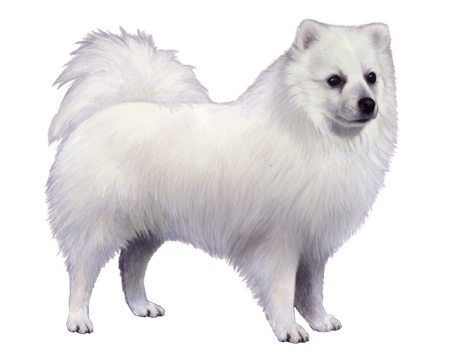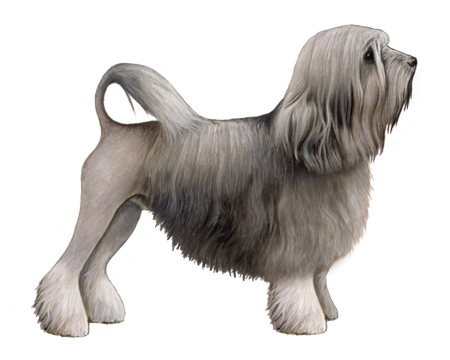
Papillon
The Papillon is a friendly, alert, and happy breed. These tiny dogs are also natural athletes that love high-energy play sessions with their owners.
Interested in discovering if your dog is a Papillon?
Check out Wisdom Panel's DNA tests.

Papillon Traits
General Appearance
The Papillon is a toy breed with an elegant bone structure and dainty gait. But they're most known for their unique, butterfly-like ears.
Coat and Colouring
Papillons have long, silky, flowing hair that lies flat on their back and sides. Their ears are well-fringed, and their tails covered with long, flowing plumes.
Their coats come in either parti-color or white with patches of any color—with black, lemon, red, sable, and tan being the most common.
Distinctive Physical Traits
Papillons are fine-boned dogs that are slightly more long than tall. They have small heads, thin muzzles, dark, round, medium-sized eyes, and alert expressions.
The butterfly-like ears that gave the breed its name may either be erect or dropped. In both cases, the ears are large with rounded tips and set on the side of the head, toward the back. Erect ears move like butterfly wings. The drop ears, known as the Phalene, are carried drooping and must be held completely down.
In Europe, Papillons with Phalene ears are a separate breed called the Continental Toy Spaniel.
Papillon Temperament
Papillons are happy, alert, and friendly. These dogs are more robust than they appear and can easily adapt to hot or cold climates. They can also happily live in big cities or wide-open spaces.
Bred as companion dogs, Papillons want to spend time with their family above all else. Left alone for too long, Papillons may develop undesirable behaviors. A second pet in the home may be enough to comfort a Papillon whose family is at work all day.
Papillons are great pets for families—including children—but may be shy around strangers. For this reason, socialization is recommended to reduce defensive, aggressive tendencies.
True to the little dog stereotype, some Papillons can be a bit yappy. Though training may help curb their barking, apartments with shared walls may not be the best environment for this breed.


Papillon History
The Papillon is one of the oldest toy breeds, with a history dating back 700 years. These little dogs traveled on trade routes between Asia and Europe, serving as "lap warmers" for noblewomen in France and Spain. Papillons appeared in historic portraits and paintings of queens and princesses. Famous artists such as Rembrandt, Goya, and Rubens also included Papillons in their artwork.
Papillons were developed by crossing existing toy breeds with spaniels, and they retained traits from all. They got their name—which means "butterfly" in French—because of their trademark butterfly ears.
Papillon Care
Nutrition
Papillons require a high-quality dog food appropriate for their life stage (e.g., puppy, adult, senior) and small size. To keep them at a healthy weight, monitor their food intake carefully. Portion out their meals with a measuring cup and limit treats to no more than 10% of their daily calories.
Grooming
Maintaining a Papillon's beautiful coat is relatively easy. Brush it once a week, giving extra attention to areas with longer hair, as those are more prone to matting. These areas include the insides of their hind legs, behind their ears, and around their thighs and buttocks.
Papillons have fast-growing nails that require regular trimming. Overgrown nails can split, crack, or make it painful to walk or run. Their dew claws may curl around and pierce their legs if not maintained.
Start a regular dental care routine when Papillons are young. Brushing their teeth and scheduling professional cleanings ensures good oral hygiene throughout their lives.
Exercise
Papillons are moderately active dogs that love accompanying their people on adventures. Whether it's an occasional walk around the block, trip to the dog park, or play session in a fenced yard, Papillons appreciate opportunities to burn off some energy.
Papillons require mental and physical stimulation. Games and puzzle toys will keep this intelligent breed engaged and active. They also enjoy activities such as competitive obedience or agility, and consistently rank among the top breeds in the sport.
Training
Papillons are intelligent and eager to please, a combination that makes them easy to train. A consistent training program that uses positive reinforcement can provide the right foundation to teach basic commands and new tricks.
Like other small breeds, it may take extra time for Papillons to master housetraining. Consistency (and patience) are key. Regular socialization is also essential to make Papillons feel comfortable with unfamiliar people, pets, and places.

Papillon Genetic Health Conditions
-
Chondrodystrophy (CDDY) and Intervertebral Disc Disease (IVDD) Risk
Chondrodystrophy (CDDY) is a skeletal disorder characterized by shortened limbs and abnormal early degeneration of the spinal discs, or intervertebral disc disease (IVDD), which predisposes to disc herniation.
-
Neuroaxonal Dystrophy (Discovered in the Papillon)
Neuroaxonal dystrophy (NAD) comprises a group of rare neurodegenerative disorders. NAD in the Papillon is characterized by an abnormal gait, blindness, tremors, and collapse.
-
Progressive Retinal Atrophy (Discovered in the Papillon and Phalène)
Progressive Retinal Atrophy (PRA) is a disorder that causes the degeneration of the light sensing retina at the back of the eye, resulting in vision loss.
-
von Willebrand's Disease, type 1
von Willebrand's Disease (vWD) Type 1 is a blood clotting disorder that typically causes mild bleeding tendencies although some affected dogs may have more severe signs. It is the result of low levels of von Willebrand's factor, a blood protein that helps stabilize blood clots.
Knowing if your Papillon is a carrier or at-risk for these conditions can help you and your veterinarian plan for your pup's lifelong care. With Wisdom Panel™ Premium, you can get results for over 200 genetic health tests.
Breed Group
Companion
This group consists of dogs typically bred for the specific purpose of human companionship, and many are popular pets because of their gentle nature. They became more common as the concept and luxury of dogs as pets prevailed.
Resources
http://images.akc.org/pdf/breeds/standards/Papillon.pdf
https://vcahospitals.com/know-your-pet/dog-breeds/papillon
Reviewed 26 July 2020 by Annette Louviere, DVM



























_Color.png)










